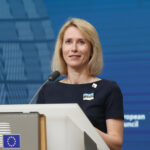In 1948, the US initiated the Marshall plan to invest $13bn ($115bn in today’s dollars) in western Europe. We need a similar plan for Africa
The continent of Africa has over 1.3 billion people – more than double the size of Europe. By 2050, that population is expected to double, giving it more than a quarter of the world’s population – many of them of young working age.
And its economies are poised for more growth. The Centre for International Development projects that seven African countries will be among the 15 fastest growing over the next five years. Improving education systems and increased trade are already improving the lives of hundreds of millions of Africans. The poverty rate continues to plummet and migration is increasing as well – spurring the spread of ideas, entrepreneurship and investment. Africa has more than 60% of the globe’s arable uncultivated land. And a new trade agreement is expected to create Africa’s first continent-wide free trade area, generating economic benefits for the country.
But the continent faces serious threats. A third of children remain malnourished. A similar amount do not finish secondary school. The Covid-19 pandemic has made these challenges more difficult, with many officials fearing Africa could lose a full decade of development. Putin’s illegal war of aggression in Ukraine has contributed to a devastating famine that is taking lives as we speak. And the climate crisis will make the hurdles for development and flourishing even higher. This is a particular injustice for a continent that contributes less than 4% of global CO2 emissions, but suffers the brunt of the impact.
We in the US have too often treated African countries not as political and economic partners, but as a security problem that needs to be addressed with military and policing solutions. This has led us to repeat the same mistakes we made in countries like Afghanistan and Iraq, with military leaders calling foreign policy shots instead of diplomats. A policy that leads with training human rights-violating militaries and police, unaccountable civilian casualties in airstrikes, and arms sales is doomed not just to fail but to backfire.
While the US focuses on geopolitics in the Middle East and Asia, China and Russia have seized opportunity on the African continent. Russia has signed military deals with at least 19 African countries since 2014 and has become the top arms supplier on the continent. Chinese companies have invested heavily in natural resources there, and Chinese trade with Africa was up to $254bn last year. Pro-Russian and Chinese misinformation are rampant.
Like many of my colleagues, I hear frequently from African ambassadors and officials that they would prefer to partner with the United States on things like infrastructure, development, and health. But too often we don’t show up, they tell me, or we’re seen as less committed than the Russians or the Chinese. African countries, like all countries, have the choice to partner with and trade with whomever they choose. The way to ensure that they choose the United States is to be their best and most reliable partner.
But great power competition with Russia and China alone cannot and should not be our guiding principle when it comes to formulating our Africa policy. Both echo colonial relationships that we should be taking great pains not to continue or re-create.
Our engagement should instead be guided by stalwart respect for democracy and human rights. A landmark study by the UN development program in 2017 shows that people who join violent extremist groups throughout the continent – from al-Shabaab to Boko Haram – are generally from geographically isolated and socially marginalized groups, and most name the precipitating event before joining one of these groups to be a low-level human rights violation.
So in terms of narrow counter-terrorism policy, support for governments, militaries, and police that violate human rights – rather than local civil society – is self-defeating. Only support for democratic institution building and accountability for human rights violations can remove the root causes of extremism.
In order to have a sustainable, growing, and egalitarian continent, we must invest in solutions on the continent – whether it is in agricultural productivity, infrastructure, democratic governance, combating extremism, or tackling the climate crisis. Our role must be as partners with the movements and civil society groups acting on the ground. And we must center peaceful engagement – on investment, diplomatic and NGO fronts.
In 1948, the US initiated the Marshall plan to invest $13bn ($115bn in today’s dollars) in western Europe to help European economies become self-reliant and prevent the spread of Soviet totalitarianism. We need a Marshall plan for Africa, one that marshals the resources of the United States and the ingenuity of the African people to build a truly prosperous continent.
There are policies that can achieve this. In 2020, I introduced a package called the Pathway to Peace. It includes the Youthbuild International Act, replicating the highly successful domestic YouthBuild program, which has partnered with more than 275 organizations to help disadvantaged youth obtain the education and employment skills they need to achieve economic self-sufficiency. The package also includes the Global Peacebuilding Act, which transfers $5bn from the Pentagon to create new multilateral peacebuilding funds.
The contours of this investment must be genuinely locally driven, not top-down or dictated by the US, Europe, or big NGOs and foundations. This means that, for example, agricultural investments need to take into account Indigenous practices, prioritize small-scale farmers and women, and preserve local staple rotations rather than focus on large-scale monoculture for export. Infrastructure projects must be driven by the communities on the ground. And governance issues must be determined by the people who live in those countries, not imposed by outsiders. Only then will these investments be truly self-sustaining.
We have an opportunity to build a partnership that undoes centuries of distrust and colonization, and helps create a truly resilient and self-reliant Africa. For the sake of the billions of Africans, the United States of America, and the world at large, I hope we undertake this effort.
Source: The Guardian















